

Postively Limitless. Postively Limitless. I recently saw Robert MacMillan (@robfmac) tweet about Growth Mindsets and a resource he had typed up and shared in different formats: As someone who is trying to develop their sketchnoting skills I thought I’d have a go at creating my own version of it using Paper by 53.
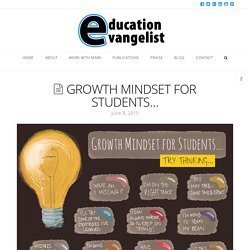
When done, I wasn’t too overly happy with the title, so I used the Creative Cloud tie-in and sent the finished piece to Photoshop and added a new title written using the lovely Amatic SC font. One of the great features of Paper is the ‘Mix’ sharing ecosystem that it provides allowing for others to share their work so that it can be remixed. I cannot take credit for the lovely lightbulb that sits on the top left hand corner. That was created by Rachel Haynes whose website is here and Mix profile is here. Any how, I thought I’d share what I made and hope you find it useful.
Teaching students that intelligence can grow and blossom with effort – rather than being a fixed trait they’re just born with – is gaining traction in progressive education circles.
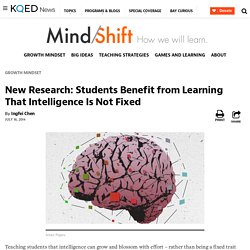
And new research from Stanford is helping to build the case that nurturing a “growth mindset” can help many kids understand their true potential. The new research involves larger, more rigorous field trials that provide some of the first evidence that the social psychology strategy can be effective when implemented in schools on a wide scale.
Even a one-time, 30-minute online intervention can spur academic gains for many students, particularly those with poor grades. The premise is that these positive effects can stick over years, leading for example to higher graduation rates; but long-term data is still needed to confirm that. Knowledge about how the brain works can make a big difference when confronting difficult learning situations.
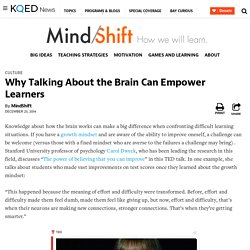
If you have a growth mindset and are aware of the ability to improve oneself, a challenge can be welcome (versus those with a fixed mindset who are averse to the failures a challenge may bring). Stanford University professor of psychology Carol Dweck, who has been leading the research in this field, discusses “The power of believing that you can improve” in this TED talk. In one example, she talks about students who made vast improvements on test scores once they learned about the growth mindset: “This happened because the meaning of effort and difficulty were transformed. Before, effort and difficulty made them feel dumb, made them feel like giving up, but now, effort and difficulty, that’s when their neurons are making new connections, stronger connections.
The Learning Pit: Fostering a Growth Mindset. John Hattie & His High Impact Strategies. Note, this article refers to John Hattie’s 2009 book, Visible Learning.

You can find an updated summary of his findings here. John Hattie synthesized over 500,000+ studies related to student achievement in his book Visible Learning. Leading and learning: Education Readings John Hattie / literacy/ Finland/ Inquiry learning/ and more Sir Ken Robinson. By Allan Alach I welcome suggested articles, so if you come across a gem, email it to me at allanalach@inspire.net.nz This week’s homework!
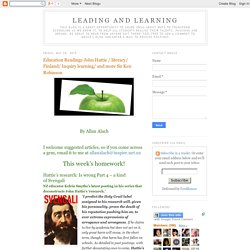
Hattie’s research: Is wrong Part 4 – a kind of Svengali NZ educator Kelvin Smythe’s latest posting in his series that deconstructs John Hattie’s ‘research.’ “I predict the Holy Grail label assigned to his research will, given his personality, prove the death of his reputation pushing him on, to ever extreme expressions of arrogance and wrongness. Game Based Learning - the suspension of reality Another article by Steve Wheeler that raises an important issue. “They are an important part of youth culture and teachers can no longer ignore computer games or believe they are irrelevant to education. Why we should focus on well-rounded young people – not exceptional grades “… there needs to be a balancing act between academia and developing essential traits crucial in the real world. When Kids Decide What They Read, They Read More. Evolution and Imagination: Teaching Growth vs Fixed Mindsets.
Showed these videos to my Year 11's today -
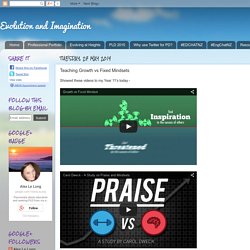
The Educator with a Growth Mindset: A Staff Workshop. I had the great privilege of facilitating a staff workshop on growth mindsets for the teachers and staff at Carlos Rosario International School and more recently at ISTE 2015.
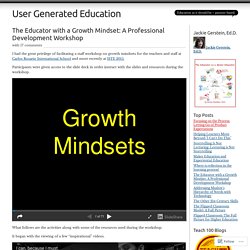
Participants were given access to the slide deck in order interact with the slides and resources during the workshop. What follows are the activities along with some of the resources used during the workshop. It began with the viewing of a few “inspirational” videos. Exploring the Characteristics of Growth v Fixed Mindsets Online resources were provided and small groups (prearranged prior to the workshop based on teaching disciplines) were asked to explore and list the characteristics of both growth and fixed mindsets. Carol Dweck: The power of believing that you can improve. Mindset Works®: Student Motivation through a Growth Mindset, by Carol Dweck, Ph.D. §. There has been a lot of talk about Growth Mindset around the education scene in New Zealand over the past few weeks.
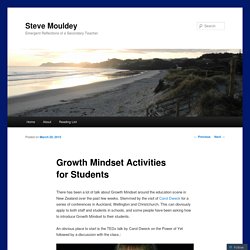
Stemmed by the visit of Carol Dweck for a series of conferences in Auckland, Wellington and Christchurch. This can obviously apply to both staff and students in schools, and some people have been asking how to introduce Growth Mindset to their students. An obvious place to start is the TEDx talk by Carol Dweck on the Power of Yet followed by a discussion with the class.